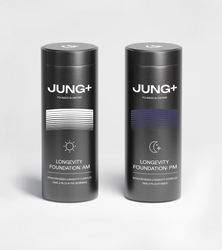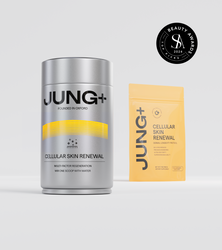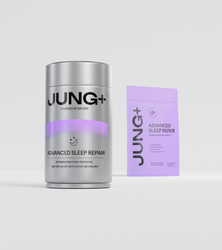A third of our lives is spent sleeping, which is critical for restoring strength, replenishing energy, healing the body, processing information through neural pathways, and renewing cells. The importance of sleep cannot be overstated. A lack of sleep not only affects mood, drains energy, and reduces cognitive function but can also lead to hallucinations and, in extreme cases, even death.
As we age, both the quality and quantity of sleep tend to decline. People become more sensitive to disruptions, struggle to fall asleep, take longer to find a comfortable sleeping position, and often sleep less overall. These changes are influenced by the fast pace of modern life, chronic stress, exposure to artificial light, societal demands, and, of course, the biological effects of aging.
In this article, we’ll explore the connection between sleep and longevity, including the molecular mechanisms that influence sleep, how sleep itself impacts those processes, and the habits that can help regulate sleep for maximum quality, duration, and rejuvenating power.
The Rejuvenating Power of Sleep
Most people have experienced short-term sleep deprivation, whether from a demanding workload, studying for an exam, a teething baby, or staying up late at a social event. Some may have skipped sleep entirely, while others only got a few hours before returning to daily life.
The following day likely felt sluggish, salvaged by a few cups of coffee and capped off with a satisfying night of recovery sleep. But what happens when that restorative sleep doesn’t arrive? Fatigue accumulates. Why does this happen?
Our bodies need sleep for proper:
Physical Restoration:
One of the first noticeable effects of sleep deprivation is physical fatigue. During deep sleep, multiple systems work in unison to restore energy and repair damaged cells and tissues.
This restoration involves key molecular pathways like protein synthesis, autophagy, hormone regulation, and reduction of oxidative stress—topics we’ll explore in more depth later.
One of the most critical processes is the nighttime release of growth hormone (somatotropin) from the anterior pituitary gland (1). Though it’s secreted in pulses throughout the day, the largest and most predictable surge occurs about 1–2 hours after falling asleep. Growth hormone is essential for (2):
-
Muscle repair and growth: It stimulates protein synthesis in muscle cells to repair and strengthen fibers.
-
Collagen production: Supports skin elasticity, bone density, and joint health.
-
Cellular regeneration and immunity: Enhances tissue renewal and immune defense.
Cognitive Renewal:
Alongside physical fatigue, sleep deprivation causes mental sluggishness. This is because inadequate sleep directly disrupts cognitive function. But how, exactly?
Synaptic Plasticity and Memory Consolidation:
-
Sleep cycles last approximately 80 minutes and include deep slow-wave sleep (SWS or N3) and REM sleep, both of which are essential for cognition. During these phases, synaptic plasticity—the brain's ability to strengthen or weaken neural connections—is enhanced (3).
-
Neurons also replay activity patterns from the waking day, reinforcing important memories and discarding irrelevant information through a process known as memory reactivation. This helps convert short-term memories into long-term storage.
Neurotransmitter Regulation and Cognitive Stability:
-
Sleep maintains optimal levels of key neurotransmitters such as acetylcholine, dopamine, serotonin, and norepinephrine:
-
During REM, acetylcholine peaks, supporting creativity, emotional memory, and problem-solving (4).
-
During deep sleep, norepinephrine drops to near zero, allowing the brain to reset its stress circuits—enhancing focus and emotional balance the next day (5).
Neurogenesis and Brain Repair:
-
Sleep promotes neurogenesis—the creation of new neurons—particularly in the hippocampus, the region responsible for learning and memory (6).
-
Growth factors like BDNF, IGF-1, and VEGF help support neuron formation, synaptic remodeling, and brain plasticity.
Emotional Resilience:
Sleep is also crucial for emotional regulation. It’s common to feel irritable after a poor night’s sleep. Chronic disruptions, however, are linked to mood disorders, stress sensitivity, and emotional instability.
-
During REM sleep, the brain processes and stabilizes emotional experiences:
-
The amygdala, our emotional center, reprocesses negative experiences and helps separate emotion from stress responses, reducing overreactions the next day (7).
-
The prefrontal cortex, which governs self-control and decision-making, coordinates with the amygdala to improve emotional regulation—explaining why people often feel more composed after a restful night.
Hormonal Balance:
Sleep helps regulate the hypothalamic-pituitary-adrenal (HPA) axis, which controls the body’s stress response via cortisol.
-
During deep sleep, cortisol levels decrease, helping the body recover from stress and reduce anxiety (8).
-
At night, oxytocin—the “love hormone”—peaks (9). Oxytocin supports emotional bonding, stress relief, immune modulation, and social communication.
Cellular Repair and Detoxification:
During deep N3 sleep, the brain’s glymphatic system becomes highly active (10).
-
Cerebrospinal fluid circulation increases, flushing out metabolic waste like beta-amyloid and tau proteins—accumulations linked to Alzheimer’s disease (11).
-
Aquaporin-4, a protein in astrocytes, facilitates this detox process and is most active during sleep (12).
The Direct Link Between Sleep and Longevity
Sleep supports many longevity-related functions. For example, sleep:
-
Regulates insulin sensitivity, glucose metabolism, and hormone balance.
-
Influences cellular repair, oxidative stress response, and immune function.
-
Boosts the body’s production of antioxidants like glutathione, superoxide dismutase, and catalase, which protect against oxidative damage and DNA aging (14).
Sleep Length vs. Sleep Quality—And Their Connection to Longevity:
If sleep is so restorative, should we aim for 12 hours per night? Not necessarily.
The U-Shaped Relationship Between Sleep Duration and Longevity:
Epidemiological studies reveal a U-shaped curve:
-
<6 hours per night increases risks for heart disease, neurodegeneration, and immune dysfunction.
-
>9 hours per night is associated with higher mortality, often tied to underlying chronic conditions (15).
-
The optimal range for most adults is 7–8 hours per night.
While correlation doesn’t prove causation, there’s strong evidence that both sleep deprivation and excessive sleep raise disease risk. The former accelerates inflammation and telomere shortening. The latter is linked to poor sleep efficiency and chronic inflammation.
What Matters More: Sleep Quality or Quantity?
While duration is important, sleep quality is the stronger predictor of longevity. High sleep quality ensures proper:
-
Autophagy
-
Telomere maintenance
-
Glymphatic clearance
-
Hormonal balance
Poor sleep—fragmented cycles, minimal deep or REM sleep—disrupts memory, metabolism, and immune resilience (16).
The Science: How Sleep Influences the 12 Hallmarks of Aging
Aging is shaped not only by time but by the accumulation of molecular and cellular damage. Here’s how sleep supports the 12 hallmarks of aging:
-
Genomic Instability: Sleep enhances DNA repair via PARP-1, which activates key pathways during rest (17), and boosts nucleotide excision repair at night (18).
-
Telomere Attrition: Deep sleep promotes growth hormone release, activating telomerase, which preserves telomere length (19, 20).
-
Epigenetic Alterations: Sleep regulates DNA methylation and histone modification. Disrupted sleep alters epigenetic expression in inflammation and metabolism (21).
-
Loss of Proteostasis: Sleep triggers autophagy and prevents protein misfolding. Poor sleep impairs heat shock protein activity (22).
-
Deregulated Nutrient Sensing: Sleep regulates AMPK, mTOR, and sirtuins, balancing insulin, leptin, and ghrelin (23, 24).
-
Mitochondrial Dysfunction: Melatonin, produced at night, acts as a mitochondrial antioxidant and protects mtDNA (25, 26).
-
Cellular Senescence: Poor sleep raises p16^INK4a and p21 levels. Restorative sleep promotes autophagy and clearance of senescent cells (27).
-
Stem Cell Exhaustion: Sleep optimizes the stem cell environment via clock genes and cytokines. Sleep loss impairs hematopoietic stem cell diversity (28).
-
Altered Intercellular Communication: Sleep balances cortisol, insulin, melatonin, and immune signals. Sleep loss increases neuroinflammation and suppresses immunity (29).
-
Chronic Inflammation: Sleep reduces NF-κB activity, boosts IL-10 and TGF-β, and lowers disease risk (30, 31).
-
Gut Dysbiosis: Melatonin supports a healthy microbiome. Poor sleep disrupts this balance, promoting inflammation and leaky gut (32).
-
Disabled Macroautophagy: Sleep aligns with circadian rhythms via CLOCK and BMAL1, optimizing autophagy during sleep-wake transitions (33, 34).
5 Habits to Ensure Sleep Quality and Quantity
In a busy world, building effective sleep habits is critical. Here are five foundational tips:
1. Maintain a Consistent Sleep Schedule:
Stick to regular wake/sleep times—even on weekends. This supports circadian rhythms and optimizes melatonin, cortisol, and gene expression cycles. To prepare for a good night's sleep:
-
Keep your room cool (60–67°F), dark, and quiet
-
Use blackout curtains, earplugs, or white noise
-
Invest in a quality mattress and pillow
-
Establish a wind-down ritual (reading, bath, foot massage)
-
Avoid screens—their blue light suppresses melatonin and increases dopamine, which makes it hard to stop scrolling
2. Limit Caffeine, Alcohol, and Heavy Meals Before Bed
Avoid stimulants and large meals 3–4 hours before bedtime. Eating late can spike glucose and delay repair processes. Morning symptoms may include bloating, headaches, and low appetite.
3. Practice Relaxation Techniques
Reduce stress with breathing exercises, meditation, gentle yoga, or soothing audio. Choose physical books over screens before bed.
4. Get Regular Exercise, But Not Too Late
Exercise improves sleep depth and reduces stress, but intense workouts in the evening may raise adrenaline and cortisol, making sleep harder. Aim to exercise earlier in the day.
Restful Nights for a Longer Life
And here’s a bonus tip: consider targeted supplements that enhance sleep.
Advanced Sleep Repair is more than just a sleep aid—it supports regenerative sleep that boosts DNA repair, metabolism, oxidative stress reduction, and neurotransmitter balance.
With ingredients like L-theanine, GABA, glycine, magnesium, B6, tryptophan, tart cherry, taurine, and zinc, it helps naturally support serotonin and melatonin production.
Getting high-quality sleep isn’t just about waking up refreshed—it’s a cornerstone of longevity and vibrant health. As we age, making sleep a priority becomes even more critical. Quality rest protects every system in the body, from metabolism and immunity to cognitive performance and emotional well-being, helping to ensure a longer, healthier life.
References:
-
Complex relationship between growth hormone and sleep in children: insights, discrepancies, and implications (2024). Frontiers in Endocrinology.
-
Physiology, Growth Hormone (2025). StatPearls Publishing.
-
Synaptic plasticity in sleep: learning, homeostasis, and disease (2012). Trends in Neurosciences.
-
Basal forebrain acetylcholine release during REM sleep is significantly greater than during waking (2001). The American Journal of Physiology-Regulatory, Integrative and Comparative Physiology.
-
Sleep-stage-specific regulation of plasma catecholamine concentration (2007). Psychoneuroendocrinology.
-
New neurons in the adult brain: The role of sleep and consequences of sleep loss (2009). Sleep Medicine Reviews.
-
REM sleep de-potentiates amygdala activity to previous emotional experiences (2012). Current Biology.
-
Interactions between sleep, stress, and metabolism: From physiological to pathological conditions (2015). Sleep Science.
-
Plasma vasopressin and oxytocin in response to exercise and during a day-night cycle in man (1982). Endokrinologie.
-
Sleep, cerebrospinal fluid, and the glymphatic system: a systematic review (2022). Sleep Medicine Reviews.
-
Clearance systems in the brain—implications for Alzheimer disease (2015). Nature Reviews Neurology.
-
Aquaporin 4 deletion exacerbates brain impairments in a mouse model of chronic sleep disruption (2020). CNS Neuroscience & Therapeutics.
-
Insufficient sleep is responsible for increased risk of metabolic disease in shift workers (2023). The Journal of Physiology.
-
The Influence of Circadian Rhythm on the Activity of Oxidative Stress Enzymes (2022). International Journal of Molecular Sciences.
-
Inverted U-shaped relationship between sleep duration and phenotypic age in US adults: a population-based study (2024). Scientific Reports.
-
Mechanisms, consequences and role of interventions for sleep deprivation: Focus on mild cognitive impairment and Alzheimer’s disease in elderly (2024). Ageing Research Reviews.
-
Parp1 promotes sleep, which enhances DNA repair in neurons (2022). Molecular Cell.
-
Circadian oscillation of nucleotide excision repair in mammalian brain (2009). PNAS.
-
The association between obstructive sleep apnea and shortened telomere length: a systematic review and meta-analysis (2018). Sleep Medicine.
-
GHRH and sleep (2004). Sleep Medicine Reviews.
-
A distinctive DNA methylation pattern in insufficient sleep (2019). Scientific Reports.
-
Heat-shock protein 70: expression in monocytes of patients with sleep apnoea and association with oxidative stress and tumour necrosis factor-alpha (2010). Journal of Sleep Research.
-
The role of Klotho and sirtuins in sleep-related cardiovascular diseases: a review study (2024). NPJ Aging.
-
Short sleep duration is associated with reduced leptin, elevated ghrelin, and increased body mass index (2004). PLOS Medicine.
-
REM-Sleep Deprivation Induces Mitochondrial Biogenesis in the Rat Hippocampus (2022). In Vivo.
-
Melatonin protects against common deletion of mitochondrial DNA-augmented mitochondrial oxidative stress and apoptosis (2007). Journal of Pineal Research.
-
Chronically disrupted sleep induces senescence in the visceral adipose tissue of C57BL/6 mice (2023). bioRxiv.
-
Sleep exerts lasting effects on hematopoietic stem cell function and diversity (2022). Journal of Experimental Medicine.
-
Sleep-Disturbance-Induced Microglial Activation Involves CRH-Mediated Galectin 3 and Autophagy Dysregulation (2022). Cells.
-
Sleep Loss Activates Cellular Inflammatory Signaling (2009). Biological Psychiatry.
-
Role of sleep deprivation in immune-related disease risk and outcomes (2021). Communications Biology.
-
Melatonin–Microbiome Two-Sided Interaction in Dysbiosis-Associated Conditions (2022). Antioxidants (Basel).
-
Circadian clock protein BMAL1 broadly influences autophagy and endolysosomal function in astrocytes (2023). PNAS.
-
Circadian autophagy rhythm: a link between clock and metabolism (2013)? Trends in Endocrinology & Metabolism.




